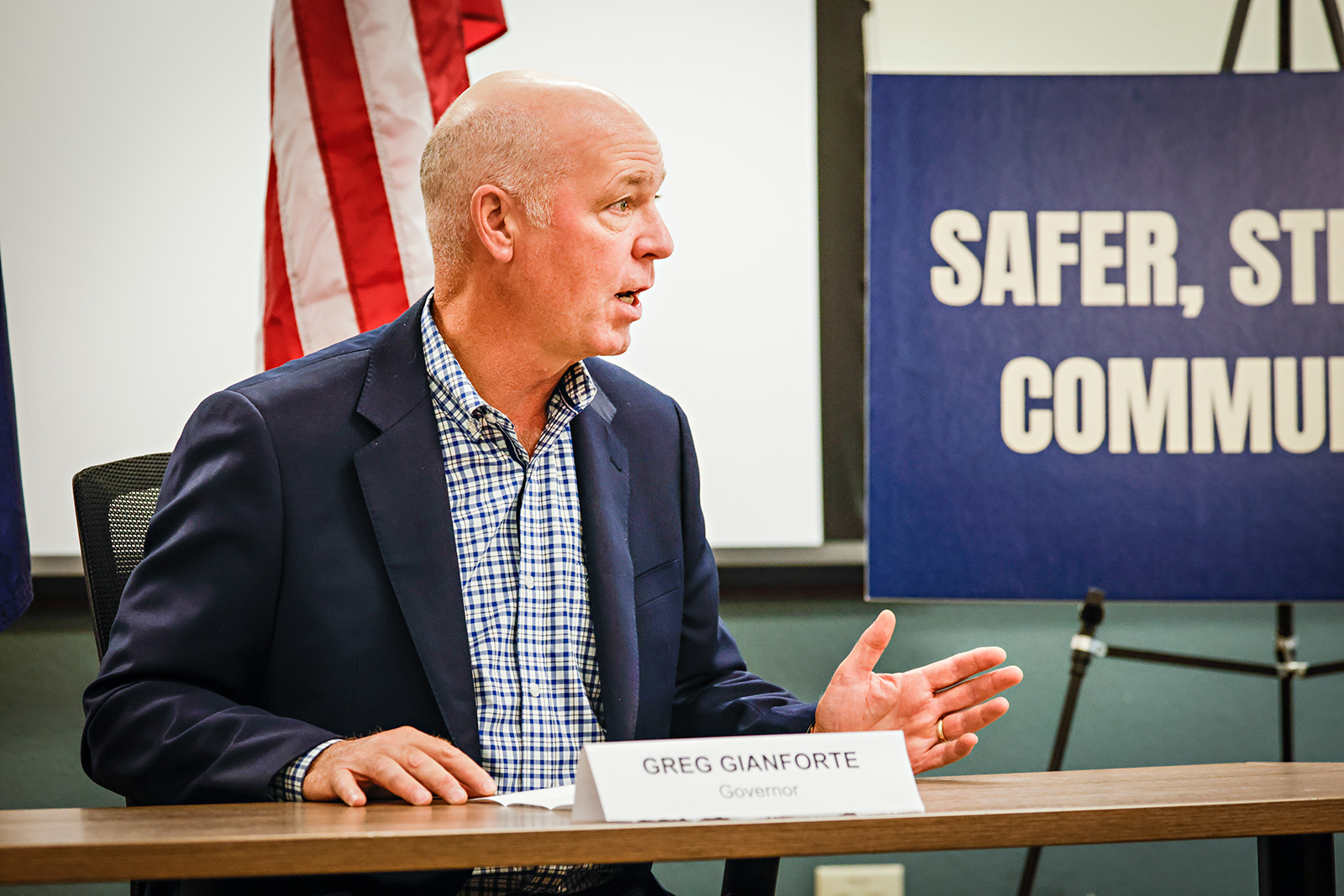Local Leaders Brainstorm Ways to Solve Fentanyl and Mental Health Crisis
Gov. Greg Gianforte met with local officials and mental health providers in Kalispell on Sept. 15
By Maggie Dresser
Gov. Greg Gianforte on Thursday met with local law enforcement, public officials and mental health and addiction treatment providers in Kalispell, where they brainstormed ways to combat the fentanyl crisis and state health department leaders introduced a safe harbor program called the Montana Angel Initiative.
The initiative, which is currently being utilized in Yellowstone, Cascade and Lewis and Clark counties, would allow those suffering with addiction to access law enforcement offices where authorities can connect people to treatment.
“The Angel Initiative is a partnership between the department of public health as well as statewide providers and law enforcement to help increase access to treatment for people who are in need,” said Ki-Ai McBride, the Department of Health and Human Services (DPHHS) Opioid Prevention Program Manager. “They can seek help by going to law enforcement if they are in possession of drugs and paraphernalia and they have the opportunity to turn that in and get assistance and be connected to a provider.”
To address fentanyl overdoses, the state has ramped up its Narcan program, distributing 50% more of the overdose-reversing medicine each year since 2018, which local law enforcement and emergency responders utilize multiple times per week.
“Montana law enforcement confiscated more fentanyl in the first six months of this year than we have in the prior three years combined … We’ve got to come up with a plan to deal with this,” Gianforte said at the roundtable discussion.
Flathead County Sheriff Brian Heino said his office has seen a significant uptick in fentanyl and drug-fueled crimes, which he partially attributed the Flathead’s population growth. He also said fentanyl is primarily entering the region through the mail system and he would like to see a solution on the federal level.
“Our mail system is essentially bringing in drugs and narcotics and it’s being delivered,” Heino said.
Flathead County Attorney Travis Ahner confirmed that about 70% of the attorney office’s caseloads involve drug-related crimes, many of which include property crimes and drug possession. He attributed the rise in crime partially to the pandemic, but he also pointed to changes in the 2017 Legislature that reduced penalties in misdemeanor offenses, which he said has resulted in the progression of crime that otherwise could have been prevented.
“There’s a lack of accountability at those early steps,” Ahner said. “I think some accountability, some wake up calls, down at that misdemeanor level would be helpful, including some of those diversion programs.”
Local mental health and addiction treatment professionals were also critical of the state’s response to numerous challenges, and Alpenglow Clinic Clinical Director Chad Kingery told the governor that inpatient treatment programs were difficult to run without funding, which is desperately needed to address the crisis.
“The aftercare program is what’s broken in this state,” Kingery said.
Kingery suggested reevaluating alcohol tax dollar distribution to a wider range of treatment providers instead of providing funding to only one facility per county. He also emphasized how the challenges of the current real estate market impacts the ability to provide inpatient treatment that would require a large facility.
“I can tell you that there is no amount of clinics that I can open and there’s no amount of employees that are perfect at doing what they do that it is ever going to generate enough revenue for us to afford the mortgage of a $2 million property,” Kingery said. “I think that kind of data extrapolates the challenges of these amazing ideas that we have – and there’s no way to get to it.”
Kalispell Mayor Mark Johnson was also frustrated with the city’s budget, which limits his ability to provide services and additional law enforcement resources within the municipality. State grants that would fund additional officers for two to three years would help in the short term, he said.
“We are woefully behind in Montana with ways to generate tax money for law enforcement,” Johnson said. “With budget constraints, we can only allocate so much.”
Gianforte told local leaders that his office would be evaluating new programs and he hoped to bring the Montana Angel Initiative to Flathead County.